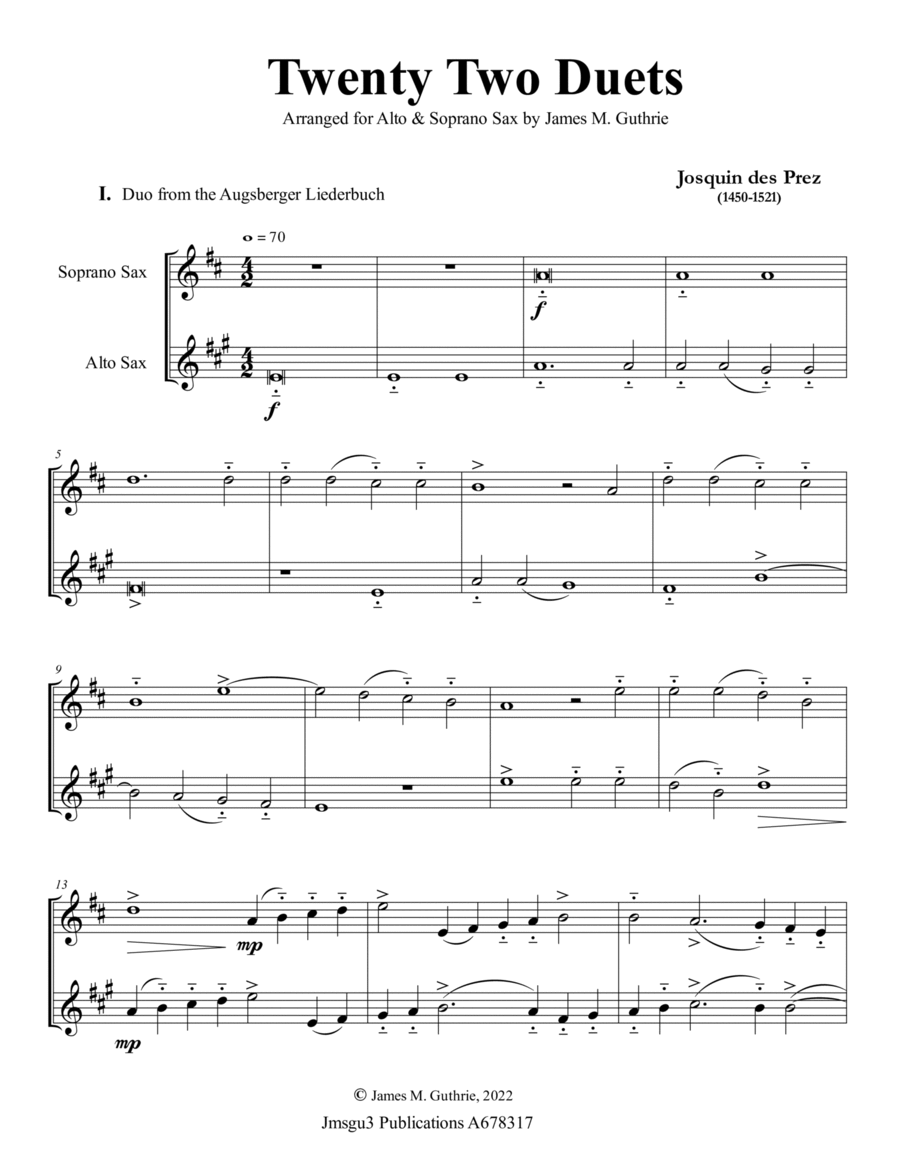Alto Saxophone,Instrumental Duet,Soprano Saxophone - Level 2 - Digital Download SKU: A0.1074047 Composed by Josquin des Prez. Arranged by James M. Guthrie. Contest,Festival,Instructional,Renaissance,Standards,Wedding. 50 pages. Jmsgu3 #678317. Published by jmsgu3 (A0.1074047). Josquin des Prez (c.1450-1521) was a composer of the Renaissance period, widely regarded as one of the greatest composers of all time. His compositions set the standard for polyphonic music and are considered a high point in the history of music. He wrote a wide range of works, including masses, motets, and chansons, and was the first composer to set popular secular tunes as mass movements. His influence can be seen in the works of many later composers, including Johann Sebastian Bach, Antonio Vivaldi, and George Frideric Handel.Josquin des Prez was a prolific composer of chamber music and duets during the Renaissance period. He wrote several types of chamber music and duets, including madrigals, chansons, and motets. His compositions are characterized by their intricate counterpoint, as well as their harmonic richness and emotional expressiveness. His works often featured two voices in harmony, and he was known to use imitation and complex canonic techniques to create interesting musical textures. Josquin's chamber music and duets are renowned for their complexity and beauty, and they remain some of the most influential and admired works from the Renaissance period.Josquin Desprez is widely regarded as one of the most influential composers of the Renaissance period. His innovative use of counterpoint and canon helped to revolutionize the musical landscape of the time. Counterpoint is a technique of combining two or more independent melodies in a way that creates harmony and a cohesive musical texture. Josquin was a master of this technique, often combining multiple voices in complex contrapuntal textures. His use of canon, or round, was also highly influential. Canon involves two or more voices repeating the same melody in different registers and often with different rhythms. Josquin wrote canons in various styles and forms, including the popular âcircular canonâ and the more complex âstrict canon.â He was also an early adopter of the âinverted canonâ form, in which the same melody is repeated but in an inverted form. Josquinâs use of counterpoint and canon had a lasting impact on the development of Western music and helped to establish the foundation for many of the musical forms and techniques still used today.Contents: I. Duo from the Augsberger LiederbuchII. Agnus Dei II from Missa De Beata Virgine III. Duo from the Hör Organ tablatureIV. Agnus Dei II from Missa Ave maris stellaV. Benedictus from Missa GaudeamusVI. Agnus Dei II from Missa GaudeamusVII. Pleni sunt coeli from the Sanctus of Missa Hercules dux Ferrarie VIII. Agnus Dei II from Missa La sol fa re mi IX. Benedictus from Missa L'homme armĂ© super voces musicalesX. Benedictus from Missa L'homme armĂ© Sexti Toni XI. Pleni sunt coeli from Missa Malheur me bat XII. Pleni sunt from Missa Mater patris (canon at the major second)XIII. Benedictus from Missa Mater patris XIV. Agnus Dei II from Missa Mater patris (canon at the unison)XV. Pleni sunt caeli from Missa Pange lingua XVI. Benedictus from Missa Pange lingua XVII. Agnus Dei II from Missa Pange lingua XVIII. Pleni sunt from Missa sine nomine XIX. Domine non secundum peccata nostra XX. Ave verum and Cuius latus XXI. In principio erat verbum from Motet Verbum caro factus est XXII. Per illud ave prolatum - Secunda pars of motet Benedicta es caelorum regina.
